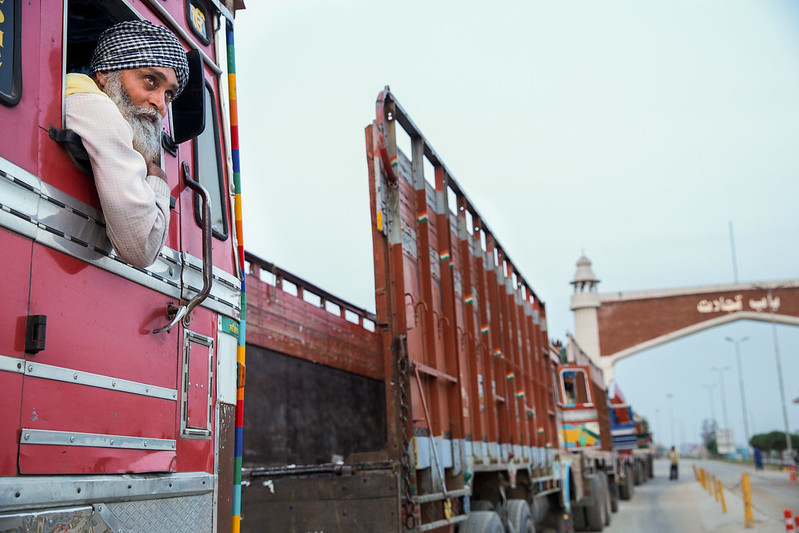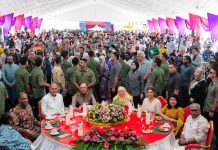
By Tridivesh Singh Maini | Opinion |
Pakistan Foreign Minister Ishaq Dar, while addressing a press conference in London, on March 23, 2024, said that Pakistan businessmen are in favour of resumption of bilateral trade with India.
While the foreign minister said that he would “seriously” look into the matter, he said that several stakeholders were involved in this decision and it was not possible to give a ‘yes or no’ response.
Dar’s statement comes at an important time, when Pakistan faces serious economic challenges, and also has strained ties with its two other neighbours Afghanistan and Iran.
After the abrogation of Article 370 by India on August 5, 2019 – and the revocation of Jammu and Kashmir’s special status – Pakistan suspended trade ties with India — via the Wagah-Attari land-crossing and downgraded diplomatic relations with India. In April 2021, then-Prime Minister Imran Khan was favorably disposed towards the resumption of trade — in essential commodities like cotton and sugar — with India, but members of his cabinet opposed the decision saying that any normalization of ties with India was not possible until India reviewed the decisions it had taken on August 5, 2019.
In 2022, Pakistan was afflicted by devastating floods which impacted an estimated 33 million people. During these floods, 8 million people were displaced and crops were destroyed. Then Pakistan Finance Minister, Miftah Ismail (who served from April 2022-September 2022), had proposed the import of food items from India, though this proposal was turned down due to political opposition.
It would be pertinent to point out here, that while bilateral trade via Wagah-Attari may have been suspended, it is carrying on through third destinations like Dubai and Singapore.
Dar — who was Finance Minister in the previous Pakistan Democratic Movement (PDM), from September 2022-August 2023, also led by Shehbaz Sharif, and has also served as Finance Minister on three other occasions (1998-1999, 2008, and 2013-2017) – also highlighted this point in response to a question by a reporter during the press conference.
“Everyone’s [business community] appeal was the same – that our imports, which are still ongoing, arrive via Dubai or Singapore, [resulting in] extra freight, extra transshipment, transportation costs, etc,”
Should India and Pakistan follow the India-China model of engagement?
While in the Pakistani establishment, there are those who believe that Pakistan should be pragmatic and follow China’s model of engagement with India, where territorial disputes have not impacted the economic relationship – though this is not true post the Galwan clashes — there are others who believe that Pakistan should not budge from its position. Current Pakistan President, Asif Ali Zardari during his earlier stint as President had also highlighted the need for India and Pakistan to de-hyphenate economic relations from contentious issues.
Chairman of Nishaat Group (one of Pakistan’s largest business houses) Mian Muhammad Mansha in an interview with The Dawn in June 2023, stated: “…Trade with India will open up many business opportunities. If China can have vibrant trade and business ties with India despite its territorial disputes, why can’t we? I think there’s nothing better than having good relations with your neighbours. And you can’t change neighbours.”
The PML-N which is leading the current coalition has been a votary of economic ties with the neighbors, especially India. Current PM Shehbaz Sharif’s brother and PML-N supremo, Nawaz Sharif, has batted for better ties with India in all his tenures as PM. In his tenure from 2013-2017, Nawaz Sharif had said that he was a supporter of “trade not aid”.
Even before the current election, Nawaz Sharif had stated that it is imperative for Pakistan to improve ties with its neighbours. In December 2023, Sharif said: “We have to mend our relations with India and Afghanistan.”
In spite of the fact that the Pakistani consumer would benefit significantly by being able to purchase certain essential commodities – especially wheat — at much cheaper prices if trade with India were to resume, there are business lobbies in Pakistan that are worried that certain sectors in Pakistan will be unable to compete. That is why it has often been recommended that trade with India should be resumed in an incremental manner.
It would be pertinent to point out,that the US and Gulf countries – Saudi Arabia and UAE – have also been nudging Pakistan to normalize ties with India.
India’s stance and possible openings
On the Indian side, the Modi government has stated that it was Pakistan that first suspended trade via land, not India. It has also stated, that engagement with Pakistan can not be de-linked from India’s concerns regarding Pakistan-sponsored terrorism.
Any decision regarding the resumption of ties will only be possible post the elections. Here it would be important to point out, that in spite of tensions between both countries, two important developments have taken place; first, the inauguration of the Kartarpur Religious Corridor — in November 2019 — which has not only been a boon for religious devotees, but also promoted bonhomie at the people to people level between Indian and Pakistani Panjab’s and the second ceasefire between both countries along the Line of Control (LOC) in February 2021 between both countries which has sustained (UAE is supposed to have played an important role behind the scenes in brokering this agreement)
It would be pertinent to point out, that there is a growing demand in the border state of Panjab (India) for the resumption of trade via the Wagah-Attari land-crossing since the suspension of trade had an adverse impact on the border belt of the state (especially the tertiary sector). Several political leaders, business groups, and farmers groups have called for the resumption of trade not only via Wagah-Attari — but opening other land crossings as well — highlighting the benefits that would accrue to all sections. Not surprisingly, businessmen from Panjab (India) reacted positively to Dar’s statement on March 23, 2024.
Conclusion
In conclusion, while the Pakistan Foreign Minister’s statement is a positive development, it is important to be realistic. The resumption of trade – which will be a welcome step – depends not just upon the views of the business community of both countries, but several other stakeholders and the overall nature of relations between Islamabad and New Delhi.

Tridivesh Singh Maini is an Assistant Professor at OP Jindal Global University. His research interests include — India’s ties with its extended neighbourhood (with a focus on Gulf and Iran), Geo-economics in South Asia, The Belt and Road Initiative (BRI) and the role of India’s states in the country’s external relations. The article was first published here.
RELATED STORY:
Sikhs fight for dignity in US politics (Asia Samachar, 13 Aug 2020)
ASIA SAMACHAR is an online newspaper for Sikhs / Punjabis in Southeast Asia and beyond. You can leave your comments at our website, Facebook
































